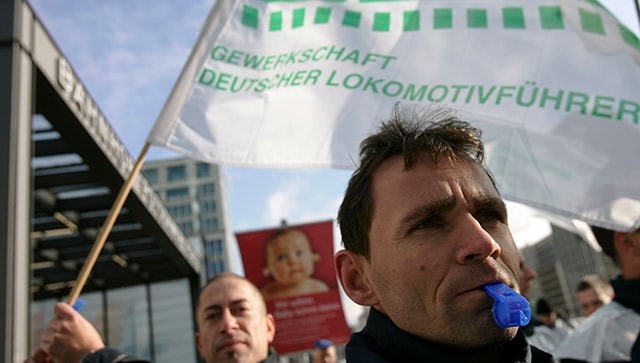
In a wave of fresh protests, Germany and France find themselves grappling with significant challenges that threaten to inflict economic damage. The turmoil includes a prolonged rail strike in Germany and widespread agricultural protests spanning both nations.
Germany is currently in the mid of its longest continuous rail strike in history with train drivers from the German Train Union (GDL) protesting against the national rail operator, Deutsche Bahn. This marks the second industrial action within a month with the current strike lasting six days. The primary demand of the GDL is a reduction in working hours without compromising on wages, a request that has been a point of contention in stalled negotiations since November. The strike’s impact is substantial, with an estimated 80 per cent of trains cancelled, prompting concerns about its repercussions on Germany’s already struggling economy.
“The strike participation is very, very high and that was already reflected in the vote last December. It’s noticeable: 80 per cent of trains are cancelled,” said striking train driver and GDL union member Philipp Grams.
As the strike unfolds, the German Rail Operator, Deutsche Bahn, acknowledges the severe implications on the economy.
“This six-day GdL strike has massive implications on the economy. If you will, the GDL is also on strike against the economy in Germany and Europe,” said German rail operator Deutsche Bahn spokeswoman Anja Broeker.
This comes at a time when Germany is already facing a recession and experts warn that events like these could further hinder economic recovery.
Concerns over Germany’s recession
Michael Groemling, Head of Cluster for Macroeconomics and Economy at the Cologne Institute for Economic Research, expresses concern about the strike’s impact on the economy.
“The strike itself will not trigger a recession, but it will throw sand in the gears of an engine that is not running smoothly anyway. And all of us know that we are currently facing a number of burdens. We really don’t need this on top,” said Groemling.
Farmers’ protests extend to France
Simultaneously, France is grappling with its own set of challenges, particularly in the agricultural sector. Farmers in both Germany and France have taken to the streets, protesting against what they perceive as excessive green regulations. In France, farmers have blocked major roads with tractors, demanding agricultural subsidies to address the rising costs associated with increased green regulations. This wave of protests, sparked by the removal of subsidies on diesel for agriculture, has far-reaching implications for France, the European Union’s largest agricultural producer.
“This anger is great, it runs deep. The crisis is deep and everywhere in France, today, we need to be heard by our politicians, by our government. But above all,we need things to move at the European level,” said dairy farmer and vice-president of French farmers’ union FNSEA, Luc Smessaert.
European Union’s role and future challenges
As both Germany and France experience unrest, there is a growing sentiment that European Union regulations are contributing to the challenges faced by farmers. The upcoming European Parliament elections in June are anticipated to be a critical juncture, with protesters hoping to garner political support to address their concerns. However, unless a viable solution is found to quell public anger and address the underlying issues, more protests are expected to emerge in the coming months, continuing to impact Europe’s faltering economy.
The ongoing unrest in Germany and France, marked by a protracted rail strike and agricultural protests, underscores the challenges facing Europe’s economies. As both nations grapple with internal turmoil, the repercussions extend beyond their borders, posing a threat to the broader European economic landscape. The outcome of these events will likely shape the direction of economic recovery in the region, making it imperative for authorities to find effective and timely solutions to address the concerns of the protesters and stabilise the economies at risk.
Views expressed in the above piece are personal and solely that of the author. They do not necessarily reflect Firstpost’s views.
Read all the Latest News, Trending News, Cricket News, Bollywood News,
India News and Entertainment News here. Follow us on Facebook, Twitter and Instagram.






